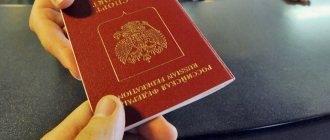At the state level, two types of control over the movement of citizens on the territory of the Russian Federation are legislatively established - registration at the place of stay and registration at the place of residence. The first is temporary, the second is permanent. At the same time, the issue of registration often becomes problematic not only for foreigners, but also for Russians who do not have their own residential property. Problems with law enforcement agencies and full social coexistence without registration will certainly arise, since by law it is mandatory for everyone.
In fact, registration is a permit for a person to live in any premises. In addition, the population’s rights to housing are secured by law. Despite this, there are situations when registration is impossible even with the consent of the owner of the living space.
This usually happens in situations with municipal apartments, in which rules regarding the established norms of area per person are observed.
Registration is also due to the need for government agencies to ensure security in the country. With the free movement of the population without registering, it is extremely difficult to track violators and persons who have committed criminal acts.
Registration in an apartment: general information
The institution of registration has been liquidated in the Russian Federation since 1993, since then it has been replaced by mandatory registration. When moving to new permanent or temporary housing, citizens are required to register:
- at the place of residence - permanent registration - which recognizes the address of a citizen’s permanent or primary residence in which he intends to reside indefinitely;
- at the place of stay - temporary registration - which recognizes a person’s temporary housing, where he intends to live for a limited period of time, the duration of which is agreed in advance with the owner of the living space.
Permanent registration is required for everyone who moves to a new permanent residence address within the first 7 days of the move. Temporary registration is issued only in cases where a citizen intends to live at a temporary address for more than 3 months, and the place of his temporary housing is located outside the subject of the federation where permanent registration has been issued.
Note!
A citizen living without registration and the owner of the premises who allowed such residence may be brought to administrative liability under Art. 19.15.1 Code of Administrative Offences. The fine is 2-3 thousand for citizens and 2-5 thousand rubles for owners. Close relatives and family members of the owner are exempt from liability under this article.
Relatives
Most often, owners register close or even distant relatives in their homes. But, knowing these people very well, they may still have some concerns about the risk of losing real estate. There is no need to be afraid of problems if all rights of the owner are properly formalized:
- Registered non-owners cannot register other people in someone else's living space.
- They will not be able to sell the property, exchange it, or rent it out.
- It is also not allowed to give housing as collateral when applying for a loan.
- The temporarily assigned person has no right to remodel the premises. Even repairs must be carried out only with the consent of the owner.
- Also, a non-owner cannot give permission for other persons to live in a house or apartment.
Anyone who is registered in the living space of an apartment that does not belong to him can simply use the housing and its amenities. He does not pose any threat to other people's rights as an owner.
In order for the owner to be more confident in his safety, he can draw up an agreement with the prescribed ones and establish rules. And you need to carefully think through all the nuances before registering one of your relatives or tenants in your apartment.
IMPORTANT! If contractual obligations are violated, people can be discharged from their living space. This issue can also be resolved through the courts.
What rights does registration in an apartment give?
Registration is one of the ways to record citizens and information about their place of residence. It is of a notification nature and reflects the fact that a citizen is at a particular address at a particular moment. Its task is to certify the act of manifestation of the will of a citizen to freely choose his place of temporary or permanent residence.
The fact of having a residence permit cannot give rise to any rights or obligations for a citizen. Registration itself does not give rights to a citizen, but only records the fact of his residence at the address.
Accordingly, the right to reside in residential premises does not arise solely on the basis of registration. The right to own, use and reside in an apartment can only arise:
- on the basis of an agreement on housing rental, free rental or other agreement concluded with the owner, including oral;
- on the basis of a social tenancy agreement;
- on the basis of the law from members of the owner's family.
If you live in an apartment under a rental agreement, the scope of rights and obligations will be determined by agreement with the owner. At the same time, registration at the specified address is not a right, but an obligation.
General information
Only the owner of residential property has the right to register additional residents in an apartment, regardless of whether it is personal or municipal property. If several people have the right to an apartment at once, then registration is possible only with written consent from each owner. From the legal side, registration without the consent of the owner and other owners is quite possible if you need to register:
Dear readers!
Our articles talk about typical ways to resolve legal issues, but each case is unique. If you want to find out how to solve your specific problem, please contact the online consultant form on the right →
It's fast and free!
Or call us by phone (24/7):
If you want to find out how to solve your particular problem, call us by phone. It's fast and free!
+7 Moscow,
Moscow region
+7 Saint Petersburg,
Leningrad region
+7 Regions
(free call for all regions of Russia)
- A minor child (provided that at least one of his parents is registered in the same apartment);
- Close relative (spouse, parent, adult children). Only a written request from the owner who owns the property is required;
- A co-owner who has a share in the apartment.
Documents for registration:
- Written statement from the owner in the prescribed form;
- Passports of all participants in the procedure (real estate owner, registered person and co-owners);
- Title documents for housing or social tenancy agreement;
- Arrival sheet;
- Written consent of the co-owners of residential property, as well as all citizens registered in the apartment (if it is municipal property);
- House book for the owner of a private house.
Who has the right to register in an apartment
Registration is carried out by the territorial divisions of the Main Department of Migration Affairs of the Ministry of Internal Affairs at the location of the apartment in which the citizen intends to register. Documents are submitted to the migration department through responsible persons: employees of the homeowners association, management company, officials of the MFC, or owners if they independently manage the property. Both temporary and permanent registration are possible only if the citizen has received written consent to move in from:
- sole owner;
- all owners, if the apartment is in shared ownership;
- all occupied tenants other than the tenant, if the apartment is provided under a social tenancy agreement;
- of the board of a residential complex or housing cooperative, if the members of the cooperative are not home owners.
Note!
The specified consent is not required if registered citizens intend to register a minor child at their address of residence.
Rights of the registered
The owner can sell, bequeath his property, exchange it, or rent it out. Also, if I am the owner, I have the right to register other people in my apartment. What can a registered person claim when he is not the owner, just a tenant?
Homeowners do not carry out registrations of this kind very often.
More applications are being submitted for registration of spouses, children, and parents. Such a registered person is a close relative; one can rarely expect negative actions from him.
If a person who has nothing to do with property rights is registered in the area of a house or apartment, can he subsequently claim the property? Upon registration, a citizen receives the right of residence . But he must also take care of the property, maintain it, maintain its integrity.
If family relationships change status, for example, during a divorce, a relative who is not the owner simply leaves the home. The owner will be able to discharge, for example, a spouse after a divorce without any problems.
In extreme cases, the court may temporarily preserve the right of residence if a person temporarily has nowhere to move or has no financial capabilities. This is an explanation of the rights of a registered privatized apartment.
ATTENTION! Registration in a municipal apartment gives all the rights of a shareholder.
The family is registered in a municipal apartment, each member acquires equal rights to use the property. These are already shareholders who are at the same level.
The difference between an owner and a tenant
The legislation sees differences in the scope of rights between ordinary apartment residents and their owners. The key difference is home ownership. Ordinary residents do not have such a right, regardless of the grounds on which they were moved into the housing. Owners, unlike tenants, can not only own and live in the premises, but also dispose of them without the approval of the tenants.
The owner has the right to independently determine the living conditions in the premises he owns. However, he is also responsible for the maintenance of the residential premises, payment of utilities, major repairs and other payments related to the maintenance of the apartment.
Social property
In a situation with private property, the law gives more rights to the owner than to the citizen registered in the apartment.
Registration does not affect the owner’s decisions regarding the implementation of any transactions with his real estate, that is, he can sell, donate or exchange it at any time. Registration does not give the tenant any right to dispose of the living space given to him exclusively for living. Things are somewhat different if the housing is social and owned by municipal authorities. Here the state acts as the owner, and registration gives all residents equal rights and opportunities. Whether to take part in privatization, if this becomes an issue, everyone decides individually, since according to the law, not the entire apartment can be privatized, but only part of it. At the same time, if full privatization is refused, registration gives the person who refused the right to use housing and live in it, as before, despite the fact that he will not have property rights. This often affects the conclusion of a transaction when the owners want to sell a privatized apartment. In this case, she will be considered encumbered.
Procedure
How does a registered person (not the owner) evict from an apartment? What needs to be done to bring the idea to life?
The owner of the premises must adhere to the following algorithm of actions:
- Invite residents to voluntarily leave the premises. These attempts, as already mentioned, need to be recorded.
- Collect documents proving certain violations.
- Prepare a package of papers required to file a claim.
- Write a claim containing a detailed description of the situation.
- Go to court with all the prepared papers.
- At the appointed time, take part in the court hearing.
- Receive the court decision and act according to it.
Important: sometimes the consent of the property owner to evict citizens is not required. Most often, such a scenario occurs if the residents of the apartment violate the interests and rights of the other residents.
How to register
To obtain permanent or temporary registration, you will need to prepare the following documents:
- statement;
- passport or birth certificate of the child, if registration is issued for him;
- the document on the basis of which registration is made: a certificate of housing ownership (when a person registers in his personal apartment), written permission from the owner or a social rent agreement when registering in municipal housing;
- written consent of the owner of the premises and other homeowners;
- act on the establishment of a trustee or guardian (if this document is available).
If a person registers permanently, then he or she will not need to provide a document confirming deregistration at the previous place of residence. As soon as the applicant registers at a new address, the previous registration will be canceled automatically.
There are several ways to register.
- The fastest and easiest way is through the government services portal, which requires a verified account. After logging in to the site, you will need to find the required service and fill out an electronic application. Then the user will receive a notification within 3 working days, which will contain information about the date of the visit to the Main Migration Department of the Ministry of Internal Affairs. You will need to provide the institution employee with the necessary documents to verify them with the information specified in the electronic application. Registration will be completed on the same day.
- You can also contact the MFC or management company. In this case, the period for providing the service will increase, since it will take time to transfer documents to the registration authority. The officer will take the documents provided by the applicant and give him a receipt in return. It will contain the approximate date of service availability.
- Finally, you can visit the Main Migration Department of the Ministry of Internal Affairs and provide the employee with all the necessary documents. A representative of the authorities will receive them and inform the applicant when he needs to visit the institution again. The service delivery period ranges from 3 to 8 working days. Disadvantages: there is a queue and the institution’s operating hours are not always convenient.
Grounds for eviction
Eviction from an apartment of a registered person (not the owner) is carried out only if there are certain grounds for this. There are a lot of them.
For example, in Russia the following cases most often occur:
- use of housing for other purposes;
- damage to property;
- inappropriate behavior of the resident (dangerous, inappropriate);
- disrespect for the interests and rights of other residents;
- expiration of the registration period;
- the desire of the apartment owner to get rid of unnecessary people;
- unlawful behavior of residents;
- failure to fulfill the terms of the agreement with the owner of the property (if there is one);
- debts on utility bills.
All of these serve as reasons why a person may be evicted from an apartment. What options for the development of events take place?
How are payments for services made?
Payments for utility services are calculated according to tariffs approved by regional authorities
Recently, for city residents, the topic of calculating rent is probably the most popular.
In order to understand how accruals occur, you need to understand: for what and from what calculation the payment is made.
The first thing that is important is the types of services, they can be:
- utilities;
- housing.
The first includes the supply of resources necessary for a person. They make up about seventy percent of the entire payment.
Consumption per unit is paid at certain tariffs, which are approved by regional authorities. Usually this happens once a year.
It should be understood that they do not depend on who the payer is: the owner or the tenant. All payments are calculated using the same rules for everyone.
Deception and scammers
Nowadays, so-called black realtors are actively working in Russia. These are scammers who are trying to take over someone else's home. After this, any person can be registered in the apartment and even the residential property can be sold.
Black realtors work without any contracts. Therefore, it is almost impossible to evict such people from the apartment and regain their home.
Nowadays, many unscrupulous realtors register in apartments with socially disadvantaged families. Then they pay off all debts and offer to buy good housing at a good price. One apartment/house is shown, and during the transaction a completely different property is acquired. This option is bad because all actions of realtors are legal - families themselves sign the purchase and sale agreement. It is almost impossible to prove fraud. Therefore, it will not be possible to hire realtors and get your home back.
Ownership opportunities
All existing property is divided into two types - privatized and municipal. The latter real estate cannot be the object of transactions, so fraudulent transactions with it are reduced to almost zero. The owner, who has rights to the apartment, which are confirmed by documents, can solely dispose of it. Registration does not give the tenant such a right, being limited only to the possibility of living and using common property. As an exception, it can be noted that registration gives the tenant the right to independently register his young child in the house, which can create serious difficulties for the owner.
An owner who has rights to an apartment, whatever the grounds for this, cannot forcibly
evict a child without a court decision. In addition, even the right of ownership does not give him the opportunity to get rid of unwanted tenants if a person and a child have nowhere to move out, that is, there is nowhere to register or the housing conditions do not meet the requirements of sanitary and technical standards. In addition, in such decisions, guardianship authorities are involved, therefore, to resolve such controversial issues, it is necessary to seek help from a qualified, experienced specialist.
Does the number of people registered affect the rent, and how exactly?
How does the number of people registered affect the rent? Let us consider in detail exactly what indicators and reasons will influence the amount of payment when registering additional persons.
Of course, this amount will affect the rent in the absence of meters.
In this case, for example, if at first one person was registered in the premises and someone else registered, therefore, the payment for gas, hot and cold water will double.
When registering three people, triple the amount and so on. The maintenance of housing and heating will remain unchanged; they are calculated based on the square footage of the apartments. Therefore, the answer to the question of whether the number of registered people affects the rent is quite simple.
The price of such services depends on the number of registered people:
- electricity;
- gas;
- cold and hot water supply;
- garbage removal.
Other types of payments do not depend on the number of registered persons.
When there are meters, this eliminates the dependence of payments from registered people in the premises. Therefore, if special metering devices are installed in the premises, the list of utility bills that depend on the number of registered ones is significantly reduced.
Former family members
Quite often in practice it is necessary to evict a spouse from an apartment. If we are talking about a current family member, then getting rid of him is not so easy. There must be good reasons for this.
But it is much easier to write out former family members (mothers-in-law, fathers-in-law, spouses). It is enough to attach to the previously listed documents:
- divorce certificate;
- documents indicating the interruption of kinship with a person;
- payment slips addressed to the homeowner;
- witness statements;
- extracts from Rosreestr indicating that the former relative has another home.
In some cases, the owner of the apartment is obliged to provide a former relative with new housing. Such a decision is also made only by court. It occurs only in relation to alimony-obligated citizens.









